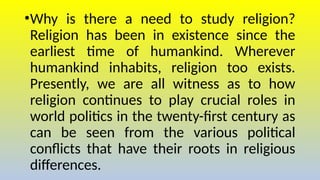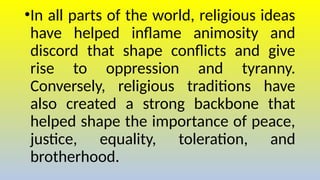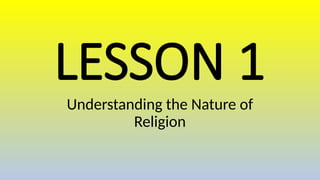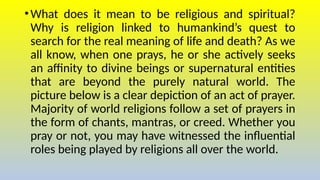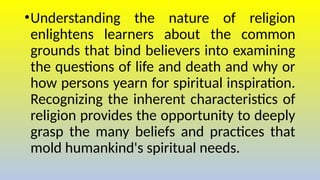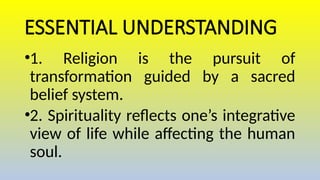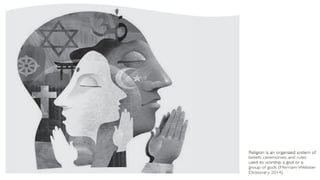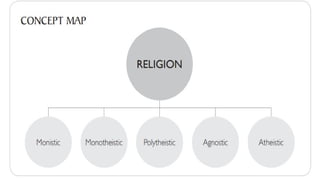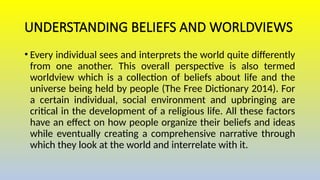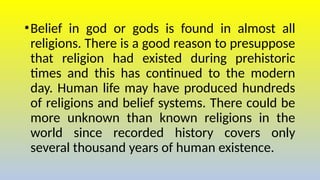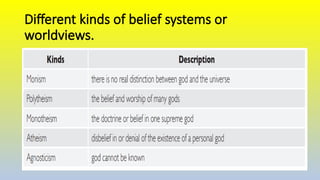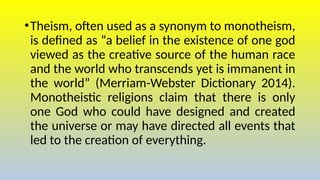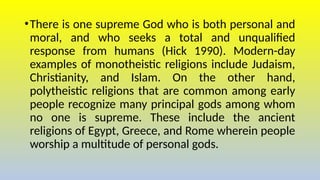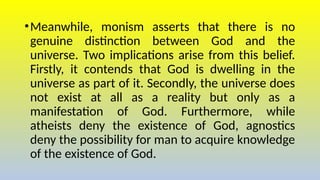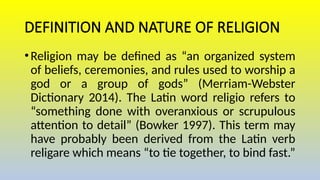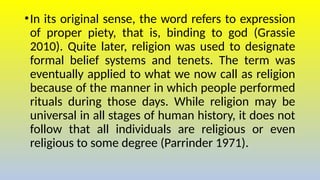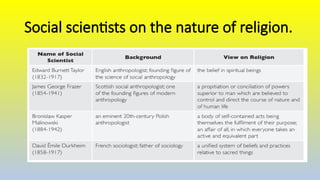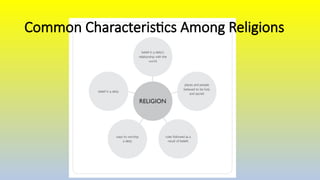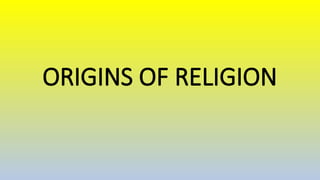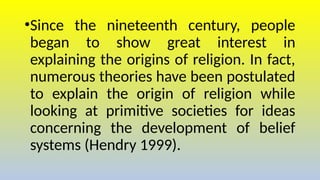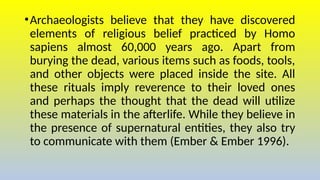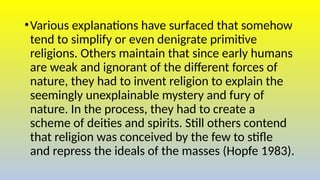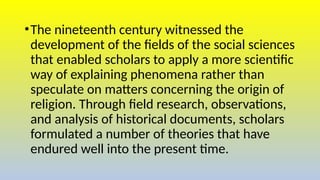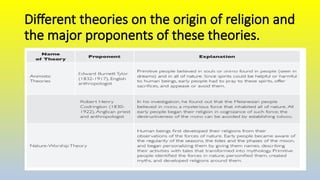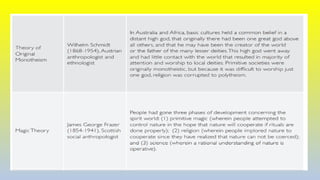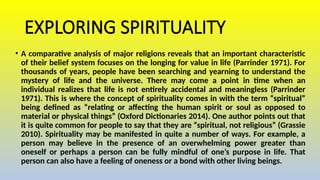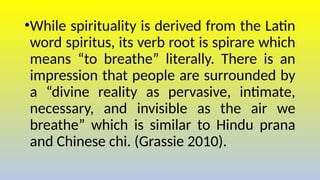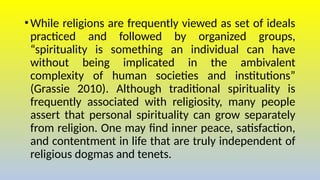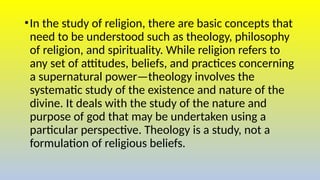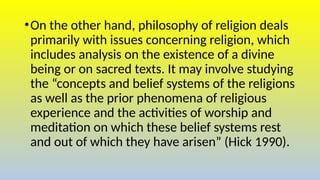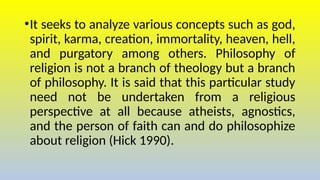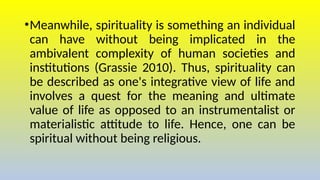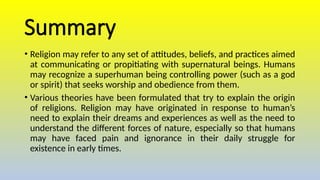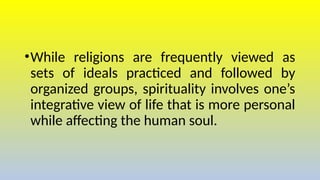World-Religions-Lesson-1aaaaaaaaaaa.pptx
- 2. ŌĆóWhy is there a need to study religion? Religion has been in existence since the earliest time of humankind. Wherever humankind inhabits, religion too exists. Presently, we are all witness as to how religion continues to play crucial roles in world politics in the twenty-first century as can be seen from the various political conflicts that have their roots in religious differences.
- 3. ŌĆóIn all parts of the world, religious ideas have helped inflame animosity and discord that shape conflicts and give rise to oppression and tyranny. Conversely, religious traditions have also created a strong backbone that helped shape the importance of peace, justice, equality, toleration, and brotherhood.
- 4. LESSON 1 Understanding the Nature of Religion
- 5. ŌĆóWhat does it mean to be religious and spiritual? Why is religion linked to humankindŌĆÖs quest to search for the real meaning of life and death? As we all know, when one prays, he or she actively seeks an affinity to divine beings or supernatural entities that are beyond the purely natural world. The picture below is a clear depiction of an act of prayer. Majority of world religions follow a set of prayers in the form of chants, mantras, or creed. Whether you pray or not, you may have witnessed the influential roles being played by religions all over the world.
- 6. ŌĆóUnderstanding the nature of religion enlightens learners about the common grounds that bind believers into examining the questions of life and death and why or how persons yearn for spiritual inspiration. Recognizing the inherent characteristics of religion provides the opportunity to deeply grasp the many beliefs and practices that mold humankind's spiritual needs.
- 7. ESSENTIAL UNDERSTANDING ŌĆó1. Religion is the pursuit of transformation guided by a sacred belief system. ŌĆó2. Spirituality reflects oneŌĆÖs integrative view of life while affecting the human soul.
- 10. UNDERSTANDING BELIEFS AND WORLDVIEWS ŌĆó Every individual sees and interprets the world quite differently from one another. This overall perspective is also termed worldview which is a collection of beliefs about life and the universe being held by people (The Free Dictionary 2014). For a certain individual, social environment and upbringing are critical in the development of a religious life. All these factors have an effect on how people organize their beliefs and ideas while eventually creating a comprehensive narrative through which they look at the world and interrelate with it.
- 11. ŌĆóBelief in god or gods is found in almost all religions. There is a good reason to presuppose that religion had existed during prehistoric times and this has continued to the modern day. Human life may have produced hundreds of religions and belief systems. There could be more unknown than known religions in the world since recorded history covers only several thousand years of human existence.
- 12. Different kinds of belief systems or worldviews.
- 13. ŌĆóTheism, often used as a synonym to monotheism, is defined as ŌĆ£a belief in the existence of one god viewed as the creative source of the human race and the world who transcends yet is immanent in the worldŌĆØ (Merriam-Webster Dictionary 2014). Monotheistic religions claim that there is only one God who could have designed and created the universe or may have directed all events that led to the creation of everything.
- 14. ŌĆóThere is one supreme God who is both personal and moral, and who seeks a total and unqualified response from humans (Hick 1990). Modern-day examples of monotheistic religions include Judaism, Christianity, and Islam. On the other hand, polytheistic religions that are common among early people recognize many principal gods among whom no one is supreme. These include the ancient religions of Egypt, Greece, and Rome wherein people worship a multitude of personal gods.
- 15. ŌĆóMeanwhile, monism asserts that there is no genuine distinction between God and the universe. Two implications arise from this belief. Firstly, it contends that God is dwelling in the universe as part of it. Secondly, the universe does not exist at all as a reality but only as a manifestation of God. Furthermore, while atheists deny the existence of God, agnostics deny the possibility for man to acquire knowledge of the existence of God.
- 16. DEFINITION AND NATURE OF RELIGION ŌĆóReligion may be defined as ŌĆ£an organized system of beliefs, ceremonies, and rules used to worship a god or a group of godsŌĆØ (Merriam-Webster Dictionary 2014). The Latin word religio refers to ŌĆ£something done with overanxious or scrupulous attention to detailŌĆØ (Bowker 1997). This term may have probably been derived from the Latin verb religare which means ŌĆ£to tie together, to bind fast.ŌĆØ
- 17. ŌĆóIn its original sense, the word refers to expression of proper piety, that is, binding to god (Grassie 2010). Quite later, religion was used to designate formal belief systems and tenets. The term was eventually applied to what we now call as religion because of the manner in which people performed rituals during those days. While religion may be universal in all stages of human history, it does not follow that all individuals are religious or even religious to some degree (Parrinder 1971).
- 18. Social scientists on the nature of religion.
- 19. Common Characteristics Among Religions
- 21. ŌĆóSince the nineteenth century, people began to show great interest in explaining the origins of religion. In fact, numerous theories have been postulated to explain the origin of religion while looking at primitive societies for ideas concerning the development of belief systems (Hendry 1999).
- 22. ŌĆóArchaeologists believe that they have discovered elements of religious belief practiced by Homo sapiens almost 60,000 years ago. Apart from burying the dead, various items such as foods, tools, and other objects were placed inside the site. All these rituals imply reverence to their loved ones and perhaps the thought that the dead will utilize these materials in the afterlife. While they believe in the presence of supernatural entities, they also try to communicate with them (Ember & Ember 1996).
- 23. ŌĆóVarious explanations have surfaced that somehow tend to simplify or even denigrate primitive religions. Others maintain that since early humans are weak and ignorant of the different forces of nature, they had to invent religion to explain the seemingly unexplainable mystery and fury of nature. In the process, they had to create a scheme of deities and spirits. Still others contend that religion was conceived by the few to stifle and repress the ideals of the masses (Hopfe 1983).
- 24. ŌĆóThe nineteenth century witnessed the development of the fields of the social sciences that enabled scholars to apply a more scientific way of explaining phenomena rather than speculate on matters concerning the origin of religion. Through field research, observations, and analysis of historical documents, scholars formulated a number of theories that have endured well into the present time.
- 25. Different theories on the origin of religion and the major proponents of these theories.
- 28. EXPLORING SPIRITUALITY ŌĆó A comparative analysis of major religions reveals that an important characteristic of their belief system focuses on the longing for value in life (Parrinder 1971). For thousands of years, people have been searching and yearning to understand the mystery of life and the universe. There may come a point in time when an individual realizes that life is not entirely accidental and meaningless (Parrinder 1971). This is where the concept of spirituality comes in with the term ŌĆ£spiritualŌĆØ being defined as ŌĆ£relating or affecting the human spirit or soul as opposed to material or physical thingsŌĆØ (Oxford Dictionaries 2014). One author points out that it is quite common for people to say that they are ŌĆ£spiritual, not religiousŌĆØ (Grassie 2010). Spirituality may be manifested in quite a number of ways. For example, a person may believe in the presence of an overwhelming power greater than oneself or perhaps a person can be fully mindful of oneŌĆÖs purpose in life. That person can also have a feeling of oneness or a bond with other living beings.
- 29. ŌĆóWhile spirituality is derived from the Latin word spiritus, its verb root is spirare which means ŌĆ£to breatheŌĆØ literally. There is an impression that people are surrounded by a ŌĆ£divine reality as pervasive, intimate, necessary, and invisible as the air we breatheŌĆØ which is similar to Hindu prana and Chinese chi. (Grassie 2010).
- 30. ŌĆóWhile religions are frequently viewed as set of ideals practiced and followed by organized groups, ŌĆ£spirituality is something an individual can have without being implicated in the ambivalent complexity of human societies and institutionsŌĆØ (Grassie 2010). Although traditional spirituality is frequently associated with religiosity, many people assert that personal spirituality can grow separately from religion. One may find inner peace, satisfaction, and contentment in life that are truly independent of religious dogmas and tenets.
- 31. ŌĆóIn the study of religion, there are basic concepts that need to be understood such as theology, philosophy of religion, and spirituality. While religion refers to any set of attitudes, beliefs, and practices concerning a supernatural powerŌĆötheology involves the systematic study of the existence and nature of the divine. It deals with the study of the nature and purpose of god that may be undertaken using a particular perspective. Theology is a study, not a formulation of religious beliefs.
- 32. ŌĆóOn the other hand, philosophy of religion deals primarily with issues concerning religion, which includes analysis on the existence of a divine being or on sacred texts. It may involve studying the ŌĆ£concepts and belief systems of the religions as well as the prior phenomena of religious experience and the activities of worship and meditation on which these belief systems rest and out of which they have arisenŌĆØ (Hick 1990).
- 33. ŌĆóIt seeks to analyze various concepts such as god, spirit, karma, creation, immortality, heaven, hell, and purgatory among others. Philosophy of religion is not a branch of theology but a branch of philosophy. It is said that this particular study need not be undertaken from a religious perspective at all because atheists, agnostics, and the person of faith can and do philosophize about religion (Hick 1990).
- 34. ŌĆóMeanwhile, spirituality is something an individual can have without being implicated in the ambivalent complexity of human societies and institutions (Grassie 2010). Thus, spirituality can be described as one's integrative view of life and involves a quest for the meaning and ultimate value of life as opposed to an instrumentalist or materialistic attitude to life. Hence, one can be spiritual without being religious.
- 35. Summary ŌĆó Religion may refer to any set of attitudes, beliefs, and practices aimed at communicating or propitiating with supernatural beings. Humans may recognize a superhuman being controlling power (such as a god or spirit) that seeks worship and obedience from them. ŌĆó Various theories have been formulated that try to explain the origin of religions. Religion may have originated in response to humanŌĆÖs need to explain their dreams and experiences as well as the need to understand the different forces of nature, especially so that humans may have faced pain and ignorance in their daily struggle for existence in early times.
- 36. ŌĆóWhile religions are frequently viewed as sets of ideals practiced and followed by organized groups, spirituality involves oneŌĆÖs integrative view of life that is more personal while affecting the human soul.
- 37. GODBLESS

